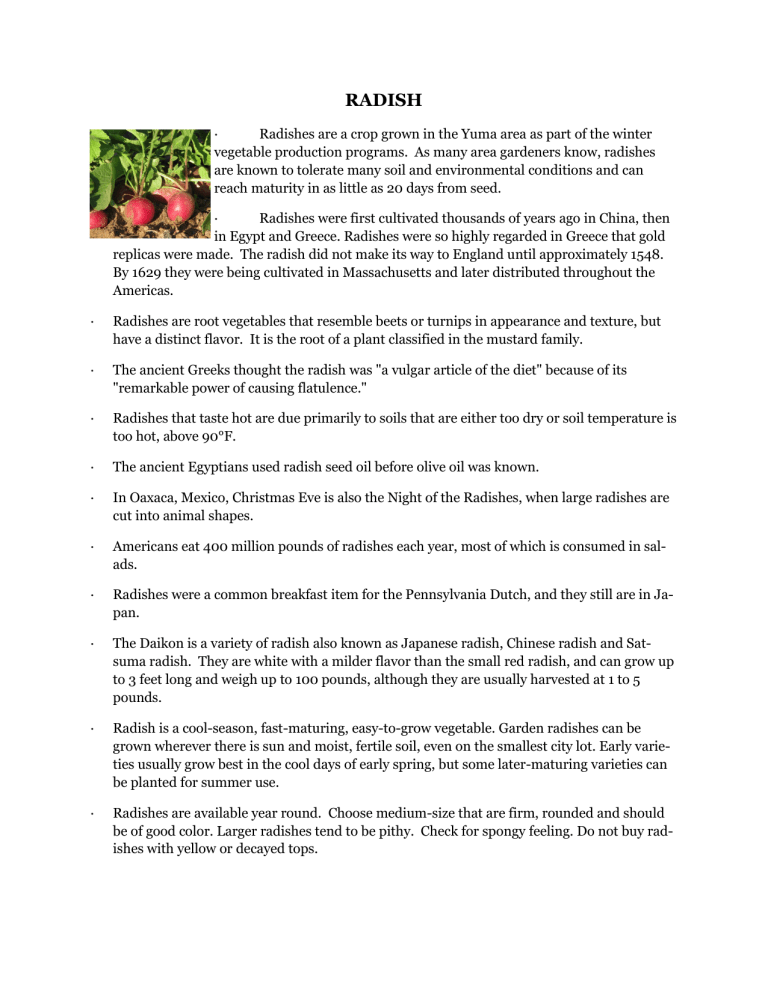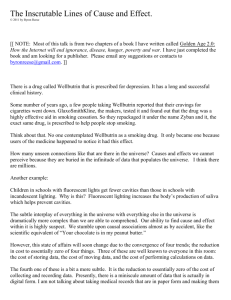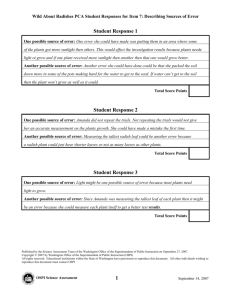RADISH

RADISH
· Radishes are a crop grown in the Yuma area as part of the winter vegetable production programs. As many area gardeners know, radishes are known to tolerate many soil and environmental conditions and can reach maturity in as little as 20 days from seed.
· Radishes were first cultivated thousands of years ago in China, then in Egypt and Greece. Radishes were so highly regarded in Greece that gold replicas were made. The radish did not make its way to England until approximately 1548.
By 1629 they were being cultivated in Massachusetts and later distributed throughout the
Americas.
· Radishes are root vegetables that resemble beets or turnips in appearance and texture, but have a distinct flavor. It is the root of a plant classified in the mustard family.
· The ancient Greeks thought the radish was "a vulgar article of the diet" because of its
"remarkable power of causing flatulence."
· Radishes that taste hot are due primarily to soils that are either too dry or soil temperature is too hot, above 90°F.
· The ancient Egyptians used radish seed oil before olive oil was known.
· In Oaxaca, Mexico, Christmas Eve is also the Night of the Radishes, when large radishes are cut into animal shapes.
· Americans eat 400 million pounds of radishes each year, most of which is consumed in salads.
· Radishes were a common breakfast item for the Pennsylvania Dutch, and they still are in Japan.
· The Daikon is a variety of radish also known as Japanese radish, Chinese radish and Satsuma radish. They are white with a milder flavor than the small red radish, and can grow up to 3 feet long and weigh up to 100 pounds, although they are usually harvested at 1 to 5 pounds.
· Radish is a cool-season, fast-maturing, easy-to-grow vegetable. Garden radishes can be grown wherever there is sun and moist, fertile soil, even on the smallest city lot. Early varieties usually grow best in the cool days of early spring, but some later-maturing varieties can be planted for summer use.
· Radishes are available year round. Choose medium-size that are firm, rounded and should be of good color. Larger radishes tend to be pithy. Check for spongy feeling. Do not buy radishes with yellow or decayed tops.
· Radish leaves can be added to salads of stir fried vegetables to add a little zest to the flavor.
The leaves are not as spicy as radish roots.
· This radish variety is the most popular in the United States and is the familiar looking red and white radish. It is small, round or oval shaped, sometimes referred to as "button" red radishes. T hey range in diameter from one to four inches (most commonly closer to one inch) and have a solid, crisp, flesh.
· Radish ( Raphanus sativus ) is a diversely formed root vegetable and has many uses worldwide. A minimum size standard for common red radish is 5/8 inch equatorial diameter.
Current crop management practices stress rapid growth to ensure a mild flavor and crisp texture. Fertilization and irrigation management, or environmental conditions that slow growth may result in a woody texture and high pungency. Over-mature radish tends to be pithy or spongy in texture and may develop harsh flavors, for most tastes.
· Remove and discard leaves and refrigerate radishes in a plastic bag for up to 5 days. Wash and trim root ends just before using. For added crispness, soak radishes in ice water for a couple of hours.
· The seeds of radishes grow in pods. T hey are edible and make a great, spicy, crunchy addition to salads.
· The radish is usually eaten raw and often put into salads. However, radishes can also be used in soups. Radishes are high in Vitamin C, folic acid, and potassium. These vitamins and minerals are good for healing cuts and bruises, keeping your memory sharp and for maintaining fluid balance in your body.
· Radishes have also been used to treat coughs, liver problems, and arthritis. The Greeks and
Romans were the first cultures to cultivate radishes. Wild ancestors of the radish have been found all over Europe and Asia.
Kurt Nolte is an area agriculture agent with the Yuma County Cooperative Extension. He can be reached at 928-726-3904.




